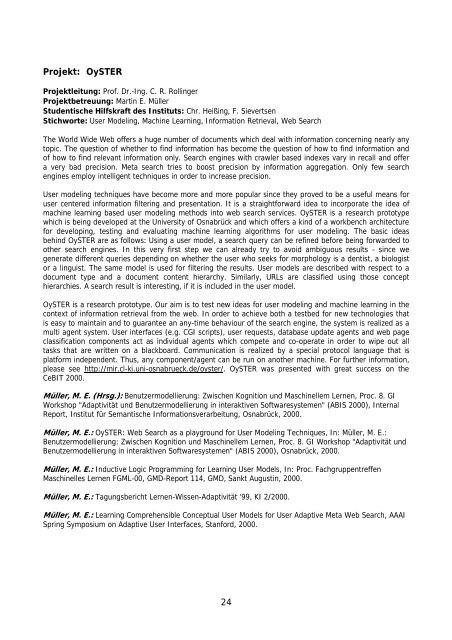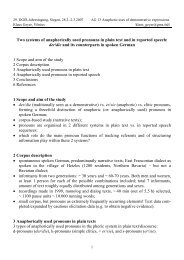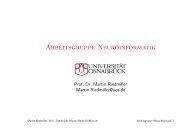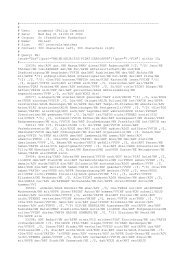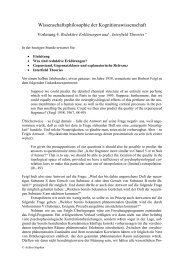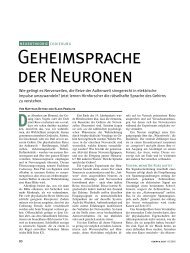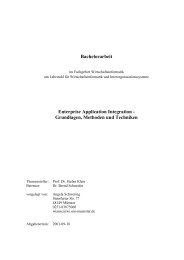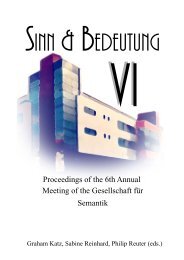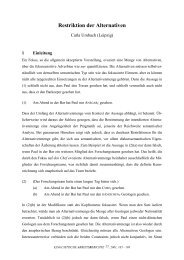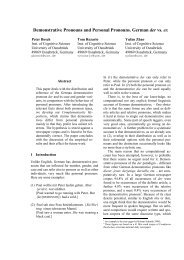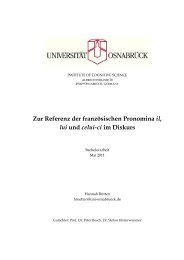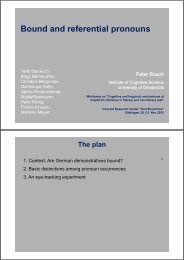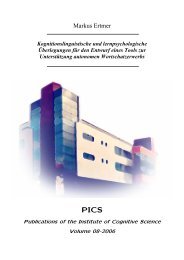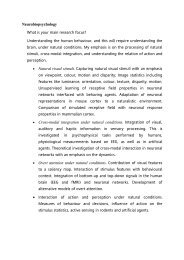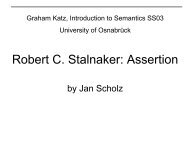Kapitel 2 Der Verein der Freunde und Förderer - Cognitive Science ...
Kapitel 2 Der Verein der Freunde und Förderer - Cognitive Science ...
Kapitel 2 Der Verein der Freunde und Förderer - Cognitive Science ...
Erfolgreiche ePaper selbst erstellen
Machen Sie aus Ihren PDF Publikationen ein blätterbares Flipbook mit unserer einzigartigen Google optimierten e-Paper Software.
Projekt: OySTER<br />
Projektleitung: Prof. Dr.-Ing. C. R. Rollinger<br />
Projektbetreuung: Martin E. Müller<br />
Studentische Hilfskraft des Instituts: Chr. Heißing, F. Sievertsen<br />
Stichworte: User Modeling, Machine Learning, Information Retrieval, Web Search<br />
The World Wide Web offers a huge number of documents which deal with information concerning nearly any<br />
topic. The question of whether to find information has become the question of how to find information and<br />
of how to find relevant information only. Search engines with crawler based indexes vary in recall and offer<br />
a very bad precision. Meta search tries to boost precision by information aggregation. Only few search<br />
engines employ intelligent techniques in or<strong>der</strong> to increase precision.<br />
User modeling techniques have become more and more popular since they proved to be a useful means for<br />
user centered information filtering and presentation. It is a straightforward idea to incorporate the idea of<br />
machine learning based user modeling methods into web search services. OySTER is a research prototype<br />
which is being developed at the University of Osnabrück and which offers a kind of a workbench architecture<br />
for developing, testing and evaluating machine learning algorithms for user modeling. The basic ideas<br />
behind OySTER are as follows: Using a user model, a search query can be refined before being forwarded to<br />
other search engines. In this very first step we can already try to avoid ambiguous results - since we<br />
generate different queries depending on whether the user who seeks for morphology is a dentist, a biologist<br />
or a linguist. The same model is used for filtering the results. User models are described with respect to a<br />
document type and a document content hierarchy. Similarly, URLs are classified using those concept<br />
hierarchies. A search result is interesting, if it is included in the user model.<br />
OySTER is a research prototype. Our aim is to test new ideas for user modeling and machine learning in the<br />
context of information retrieval from the web. In or<strong>der</strong> to achieve both a testbed for new technologies that<br />
is easy to maintain and to guarantee an any-time behaviour of the search engine, the system is realized as a<br />
multi agent system. User interfaces (e.g. CGI scripts), user requests, database update agents and web page<br />
classification components act as individual agents which compete and co-operate in or<strong>der</strong> to wipe out all<br />
tasks that are written on a blackboard. Communication is realized by a special protocol language that is<br />
platform independent. Thus, any component/agent can be run on another machine. For further information,<br />
please see http://mir.cl-ki.uni-osnabrueck.de/oyster/. OySTER was presented with great success on the<br />
CeBIT 2000.<br />
Müller, M. E. (Hrsg.): Benutzermodellierung: Zwischen Kognition <strong>und</strong> Maschinellem Lernen, Proc. 8. GI<br />
Workshop "Adaptivität <strong>und</strong> Benutzermodellierung in interaktiven Softwaresystemen" (ABIS 2000), Internal<br />
Report, Institut für Semantische Informationsverarbeitung, Osnabrück, 2000.<br />
Müller, M. E.: OySTER: Web Search as a playgro<strong>und</strong> for User Modeling Techniques, In: Müller, M. E.:<br />
Benutzermodellierung: Zwischen Kognition <strong>und</strong> Maschinellem Lernen, Proc. 8. GI Workshop "Adaptivität <strong>und</strong><br />
Benutzermodellierung in interaktiven Softwaresystemen" (ABIS 2000), Osnabrück, 2000.<br />
Müller, M. E.: Inductive Logic Programming for Learning User Models, In: Proc. Fachgruppentreffen<br />
Maschinelles Lernen FGML-00, GMD-Report 114, GMD, Sankt Augustin, 2000.<br />
Müller, M. E.: Tagungsbericht Lernen-Wissen-Adaptivität '99, KI 2/2000.<br />
Müller, M. E.: Learning Comprehensible Conceptual User Models for User Adaptive Meta Web Search, AAAI<br />
Spring Symposium on Adaptive User Interfaces, Stanford, 2000.<br />
24


